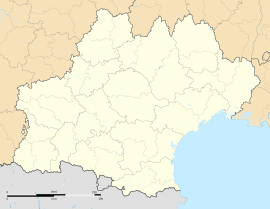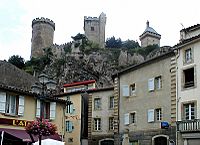Foix facts for kids
Quick facts for kids
Foix
|
|||
|---|---|---|---|
|
Prefecture and commune
|
|||
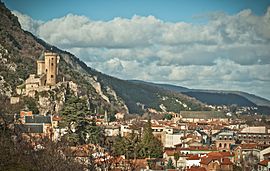
View of Chateau de Foix in Lazema area
|
|||
|
|||
| Country | France | ||
| Region | Occitanie | ||
| Department | Ariège | ||
| Arrondissement | Foix | ||
| Canton | Foix | ||
| Intercommunality | Pays Foix-Varilhes | ||
| Area
1
|
19.32 km2 (7.46 sq mi) | ||
| Population
(2014)
|
9,721 | ||
| • Density | 503.16/km2 (1,303.2/sq mi) | ||
| Demonym(s) | Fuxéen | ||
| Time zone | UTC+01:00 (CET) | ||
| • Summer (DST) | UTC+02:00 (CEST) | ||
| INSEE/Postal code |
09122 /09000
|
||
| Elevation | 358–933 m (1,175–3,061 ft) (avg. 400 m or 1,300 ft) |
||
| Website | www.mairie-foix.fr | ||
| 1 French Land Register data, which excludes lakes, ponds, glaciers > 1 km2 (0.386 sq mi or 247 acres) and river estuaries. | |||
Foix (Occitan: Fois; Catalan: Foix) is a commune, the former capital of the County of Foix. Today it is the préfecture of the Ariège department in southwestern France in the Occitanie region.
It is to south of Toulouse, close to the border with Spain and Andorra. The city is only the second city of the department after Pamiers. Of all French préfectures, Foix is the one with fewest people living in it.
Contents
History
The Romans built a fort on the rocky hill where the Château de Foix castle now overlooks the town. The town of Foix probably owes its origin to an oratory founded by Charlemagne, which afterwards became the Abbey of Saint Volusianus in 849. The current area of the department was part of the old County of Foix.
Geography
The city of Foix lies in the foothills of the Pyrénées mountains, in southern France. It is on the confluence of the Ariège and Arget rivers. Foix is at 83 km (52 mi) to the south of Toulouse.
The commune has an area of 19.3 km2 (7.5 sq mi). Its average altitude is 646 m (2,119 ft); at the city hall, the altitude is 380 m (1,250 ft).
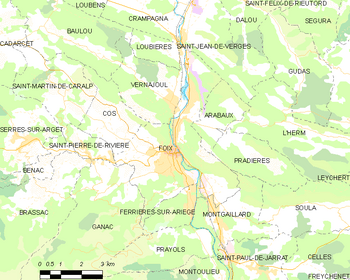 |
The commune of Foix is surrounded by the communes Arabaux, Cos, Crampagna, Ferrières-sur-Ariège, Ganac, Montgaillard, Pradières, Saint-Jean-de-Verges, Saint-Pierre-de-Rivière and Vernajoul.
 |
Cos | Vernajoul, Saint-Jean-de-Verges and Crampagna | Arabaux |  |
| Saint-Pierre-de-Rivière | Pradières | |||
| Ganac | Ferrières-sur-Ariège | Montgaillard |
Climate
The climate of Foix, in the Köppen climate classification, is Cfb - Oceanic climate with template summers.
Population
The inhabitants of Foix are known, in French, as Fuxéens (women: Fuxéennes).
Foix has a population of 6,9,721 (2014), and population density of 503 inhabitants/km2.
Evolution of the population in Foix
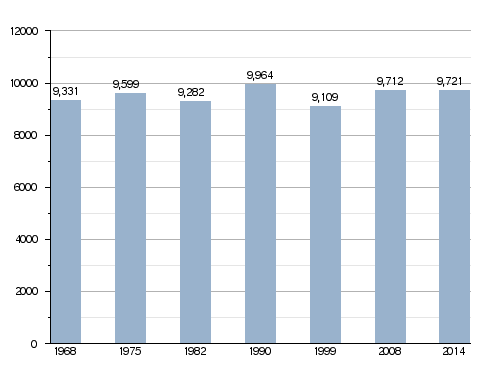
Foix forms, with other 5 communes, the urban area of Foix with a population of 14,552 inhabitants (2013) and an area of 75.8 km2 (29.3 sq mi). This urban area is the centre of the metropolitan area of Foix, formed by 17 communes with a population of 18,406 inhabitants (2013) and an area of 213.0 km2 (82.2 sq mi).
Administration
Foix is the prefecture of the Ariège department, the capital of the arrondissement of Foix and the administrative centre (French: chef-lieu) of the canton of Foix (with 13,700 inhabitants in 2014).
It is part of the intercommunality Pays Foix-Varilhes (French: Communauté d'agglomération Pays Foix-Varilhes).
Twinned and partner towns
Foix is twinned with:
Sites of interest
- The main historic building is the Castle of the Counts of Foix or, simply, Castle of Foix; it is on the top of a rocky hill that overlooks the city.
- The old town, with narrow streets and houses of traditional architecture.
- Saint-Volusien Abbey
- The Villote (small town), in the Middle Ages, was a space outside the walls surrounding the city built in 1330.
Gallery
Related pages
See also
 In Spanish: Foix para niños
In Spanish: Foix para niños





